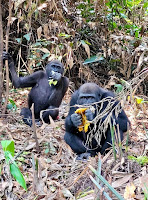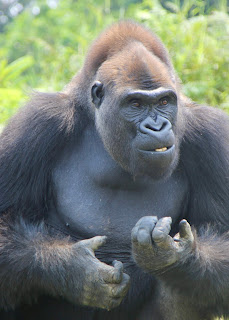Lésio-Louna / Léfini Nature Reserve
The Lésio-Louna natural reserve is located about 3.5 hours from Brazzaville, within the La Léfini Wildlife Reserve. Most of the road (N2) is new and smooth, except for a few parts where the surface is currently being redone and you are driving through white, chalky dirt. Once you turn off the N2 towards Abio (about 12 km from the destination), you will need a 4WD and it is NOT recommended to visit during the rainy season. It takes about 35 minutes to drive those last 12 km.
Abio
 |
| Boats we took to see the gorillas on the island |
The first gorilla we saw was Fubu, just across from the Abio site. He is now 19. Fubu put up a real show for us - stepping up on a wooden platform, posing with various facial expressions and standing upright as in a bodybuilding competition.
The 20 year old Kebu lives on the other side of the island, a short boat ride away. Back in Kent, Kebu was always a bit of a loner, and this desire to be solitary continues here in the Congo. He tends to stay in the forest area of the island where he can build himself comfortable nests. In 2018 he suffered from malaria - developing immunity to local diseases is part of the habituation process.
 |
| Loukelela and Boumassa |
There are no displays of gorilla photos with their ages and their personal stories like there are on Ngamba Island for the chimps. There is practically no information about the place, the inhabitants and the Aspinall Foundation. The only stories you hear come from rangers and depending on who you speak with, they vary greatly.
 |
| The hill we climbed is in the foreground |
We made a little detour on the way back to stop by Ipopi mountain. We climbed the small hill in front of the mountain and were able to admire the view of the reserve from above. The boat ride covers two rivers - Louna and Léfini. From the top of the hill we got a great view of the Léfini river which separates the Pool region from the Plateau region and later flows into the Congo river.
 |
| The cage Joshi travelled in from Kent |
Iboubriko camp is a rustic camp where tourists can spend the night while visiting the gorillas. The facility has a limited number of cabins with single or double beds and a shared kitchen with two dining areas protected by mosquito screens. The bathrooms and cold showers are also shared. Within a 10 minute walking distance is the holding facility for all gorillas that are either rescued or transported back to the wild from ZOOs and safari parks. Currently in the cage is Sid - a 34 years old silverback who had polio when he was young. Now he has other diseases as well - he has a hard time moving his jaw and will never be able to reintegrate and live in the wild.
 |
| Road leading to the camp |
Kelle, who was orphaned in Congo, came to the sanctuary when he was 2 years old. One of the rangers we met remembers carrying him on his back. He is now 24 and Sid’s mate since Joshi’s arrival. In order to facilitate Joshi’s transfer, Kelle, had to be temporarily taken off the island and put in the Ibouriko facility. This was done to avoid serious fights. He seems pretty pissed that he has to live in the cage again.
Lac Bleu
 |
| View of the lake from the "road" above |
The access to the lake is through thick vegetation. We approached on one side that was obviously developed as an access point. It has a small deck with a metal ladder, so if you are not a diver (like me) you can lower yourself gently into the lake. When we arrived there were a few local boys on the deck. Our guide chased them away but they stayed nearby, ready to come back once we departed. The lake is pristine, the water cool but not cold, so a dip was quite refreshing.
*The Aspinall Foundation
The Aspinall Foundation is an internationally renowned animal conservation charity that works in conjunction with Howletts and Port Lympne Wild Animal Parks in Kent. The organization works with local governments to protect around one million acres within the unique savannah ecosystems in Congo and Gabon and reintroduce captive gorillas back to the wild. These projects, "Projet Protection des Gorilles", (PPG) are working with local partners to stop the rapid decline of critically endangered western lowland gorillas (whose numbers were down by 60% in the past 20-25 years). Since 1989, Aspinall Foundation has rescued over 100 gorillas orphaned by the bushmeat trade and poaching. They have reintroduced over 70 gorillas back into the wild, including 26 who traveled from the Parks in Kent. Many have formed new family groups and are producing young. In total, by the end of 2018 more than 35 babies have been born in the wild across our projects in Congo and Gabon.
Sources:
https://blog.aspinallfoundation.org/two-year-anniversary-for-uk-gorillas-repatriated-to-congo
https://www.youtube.com/watch?v=53D6RvgCWbM
https://www.facebook.com/watch/?v=4102575439798335



Comments
Post a Comment